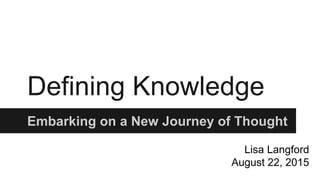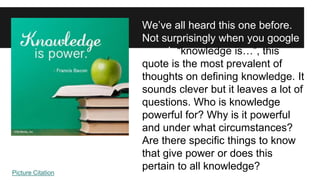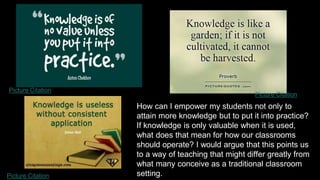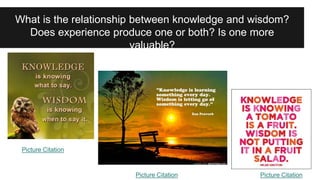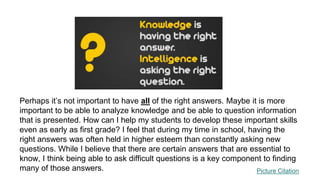Defining Knowledge
- 1. Defining Knowledge Embarking on a New Journey of Thought Lisa Langford August 22, 2015
- 2. I started a new class this past week called “Content Area Literacy”. During our first class, we were given the question to explore, “What is knowledge?”. We all gathered ideas from conversations with each other, twitter feeds and previous reflections. I personally found a lot of inspiration through a few targeted google image searches. The following are some of my findings and how they contributed to my ongoing thoughts of how to define knowledge and the quest we are all on to attain it, whether we are aware of it or not.
- 3. We’ve all heard this one before. Not surprisingly when you google search “knowledge is…”, this quote is the most prevalent of thoughts on defining knowledge. It sounds clever but it leaves a lot of questions. Who is knowledge powerful for? Why is it powerful and under what circumstances? Are there specific things to know that give power or does this pertain to all knowledge?Picture Citation
- 4. Building on the words of Francis Bacon, perhaps knowledge is not powerful unless one takes action. There are many who have great knowledge but do not use it to make a difference in the lives of others or in the world as a whole. What will happen to that knowledge once they are not longer here to have it? Is it possible that my knowledge, if not used, may in Picture Citation
- 5. How can I empower my students not only to attain more knowledge but to put it into practice? If knowledge is only valuable when it is used, what does that mean for how our classrooms should operate? I would argue that this points us to a way of teaching that might differ greatly from what many conceive as a traditional classroom setting. Picture Citation Picture Citation Picture Citation
- 6. And yet again, here is someone qualifying when and how knowledge is power. Perhaps it is about taking action and that action is in fact the sharing of knowledge with others. Does this mean that knowledge is socially constructed? Or is it just jointly discovered? How can I empower my students to take a leading role in discovering knowledge, rather than just being receivers and memorizers of information that I am using to fill them?Picture Citation
- 7. What is the relationship between knowledge and wisdom? Does experience produce one or both? Is one more valuable? Picture Citation Picture Citation Picture Citation
- 8. Perhaps it’s not important to have all of the right answers. Maybe it is more important to be able to analyze knowledge and be able to question information that is presented. How can I help my students to develop these important skills even as early as first grade? I feel that during my time in school, having the right answers was often held in higher esteem than constantly asking new questions. While I believe that there are certain answers that are essential to know, I think being able to ask difficult questions is a key component to finding many of those answers. Picture Citation
- 9. Sometimes the people who claim to have the most knowledge are in fact those with the least. Picture Citation
- 10. This quote brings me back to where I believe the power of knowledge lies. Knowledge is something that everyone is attaining whether they know it or not. It transcends race, ethnicity, gender, career, wealth, age, and the list goes on and on. While there may be some forms of knowledge that are held in higher regard, knowledge is something that is available to everyone. My job as a teacher is to help students unlock the skills and drive to pursue it. I am not so much teaching my students new knowledge as much as equipping them to find it on their own. This leaves me with perhaps more questions than answers but it is a quest that I amPicture Citation
- 11. How do you define knowledge? Join the conversation on twitter: #knowledgeis *collage created using
